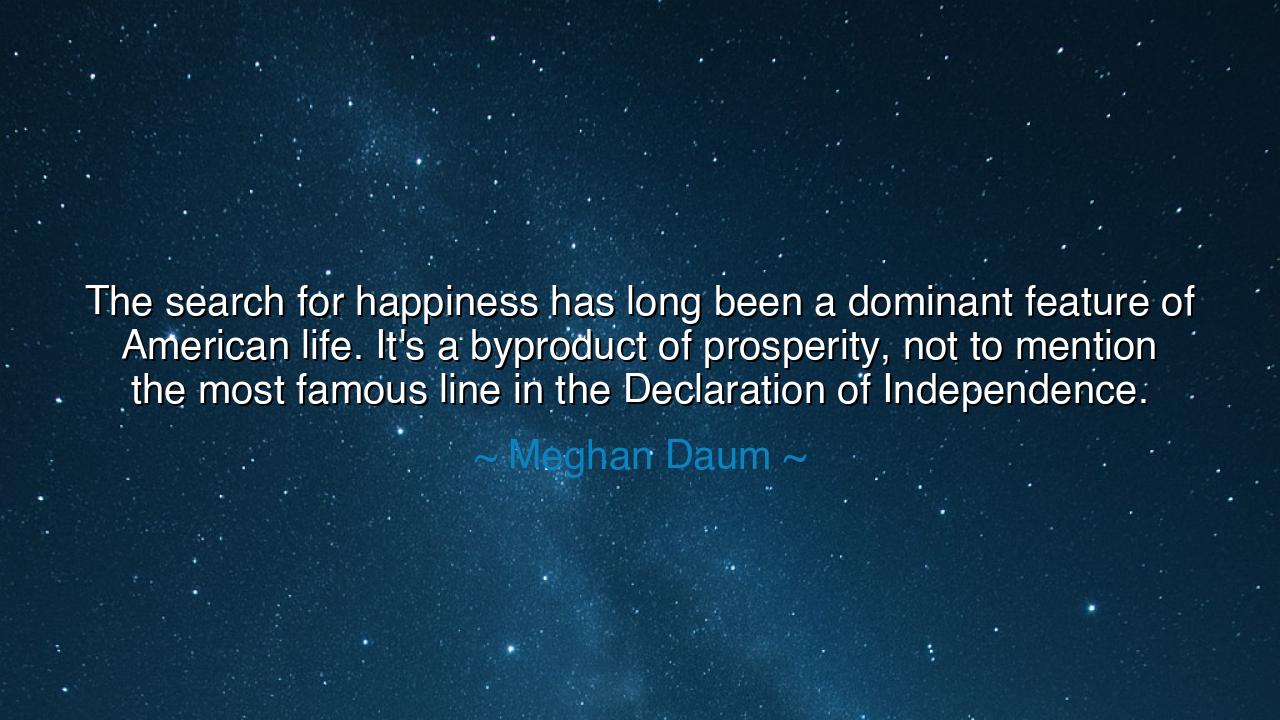
The search for happiness has long been a dominant feature of
The search for happiness has long been a dominant feature of American life. It's a byproduct of prosperity, not to mention the most famous line in the Declaration of Independence.






"The search for happiness has long been a dominant feature of American life. It's a byproduct of prosperity, not to mention the most famous line in the Declaration of Independence." – Meghan Daum
Listen, O seekers of truth and contentment, to the words of Meghan Daum, who speaks here not merely of America, but of the human heart in its restless journey toward happiness. Her reflection reminds us that the pursuit of happiness — that radiant phrase inscribed within the Declaration of Independence — has become not only a promise, but a guiding star for generations. Yet she also warns, with quiet wisdom, that happiness is not an inheritance easily kept; it is a byproduct of prosperity, fleeting and fragile, born not of wealth alone, but of balance between gratitude and desire.
The meaning of her words reaches deep into the soul of the American story. The Founding Fathers, in proclaiming the right to “life, liberty, and the pursuit of happiness,” did not promise happiness itself, but the freedom to seek it — the liberty to strive, to build, to dream. Over the centuries, that pursuit became the pulse of a nation — the great endeavor of a people who believed that joy was not granted by kings, but earned through effort, courage, and self-reliance. Yet Daum, with the clarity of the modern age, reminds us that in times of prosperity, this pursuit can shift from a noble calling to an endless hunger — the chasing of shadows when one forgets that happiness is not a possession, but a state of spirit.
The origin of her insight lies in observing the paradox of modern life: a society blessed with abundance, yet often plagued by dissatisfaction. As prosperity grew — with inventions, comforts, and freedoms unimaginable to those who penned the Declaration — so too did the longing for more. The American dream, once about freedom from oppression and the dignity of work, became entwined with the chase for material ease and personal fulfillment. Daum sees that this search for happiness, though deeply human, has become almost a duty, a measure of success itself. In a land built upon liberty, happiness has become both the goal and the burden.
History offers us a mirror to this truth. In the early days of the republic, Thomas Jefferson himself — the very author of that immortal phrase — wrestled with the meaning of happiness. For him, happiness was not mere pleasure, but virtue in harmony with freedom. It was the fulfillment of one’s potential in service to the common good. Yet, as the centuries passed, the pursuit of happiness turned inward — from virtue to comfort, from purpose to pleasure. The same prosperity that lifted millions from hardship also tempted them toward complacency. Thus, Daum’s words remind us that every blessing carries its shadow; every triumph, its trial.
But there is another layer in her thought — a gentle warning about the illusion of happiness. When she calls it a “byproduct,” she reminds us that happiness cannot be demanded or purchased. It arises naturally when one lives with integrity, gratitude, and connection. The farmer who tends his land, the artist who perfects her craft, the mother who teaches her child — each finds joy not by seeking it directly, but through devotion to something greater. To seek happiness for its own sake is to chase the wind; to serve purpose is to find happiness waiting quietly at the journey’s end.
And yet, Daum’s words do not condemn the pursuit itself. Rather, they invite us to refine it — to turn the restless search into reflection. The American spirit, in its best form, is not about endless wanting, but about hope, resilience, and the courage to keep building a better tomorrow. The challenge, then, is to remember that prosperity and freedom are not ends in themselves, but tools for growth. To be free is not simply to choose pleasure, but to choose meaning; to use our liberty not to indulge the self, but to elevate the soul.
So let this be the lesson for all who listen: happiness cannot be commanded — it must be cultivated. It is not found in riches, but in gratitude; not in escape, but in engagement. Seek purpose before pleasure, and joy will follow as naturally as light follows the sun. As Meghan Daum teaches, the search for happiness is the inheritance of a free people — but its fulfillment lies not in the promise of prosperity, but in the quiet strength to live wisely, love deeply, and labor honestly. For in the end, happiness is not something we pursue; it is something we become.






AAdministratorAdministrator
Welcome, honored guests. Please leave a comment, we will respond soon